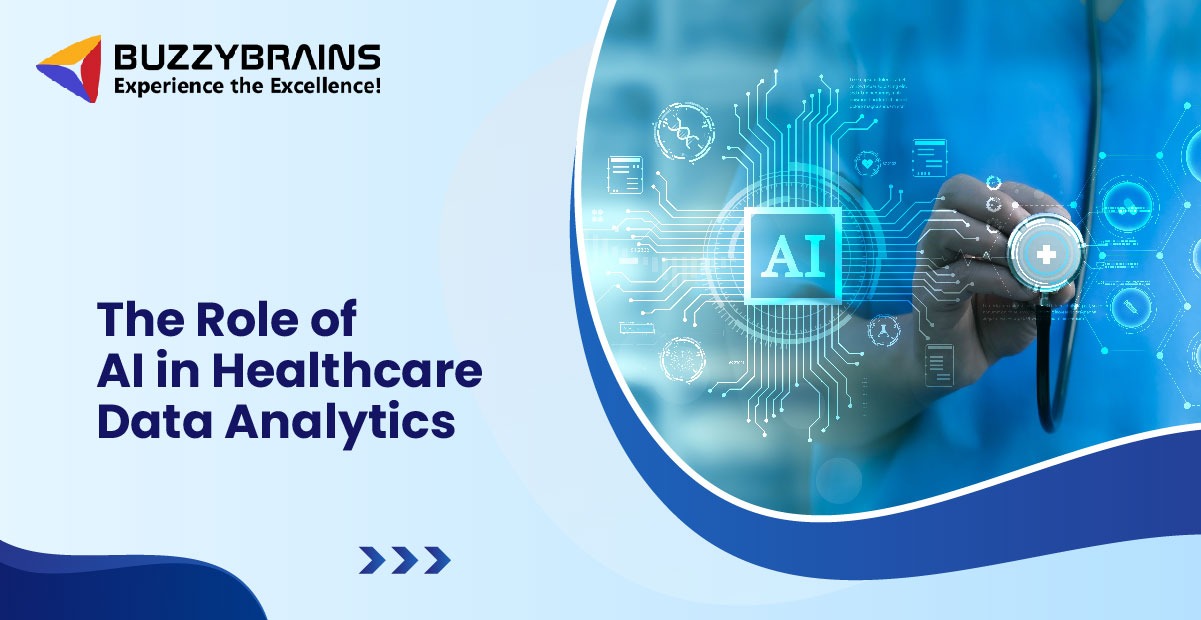The Role of AI in Healthcare Data Analytics

The healthcare industry is undergoing a seismic shift, driven by the rapid integration of Artificial Intelligence (AI). AI’s ability to analyze complex datasets and derive actionable insights is revolutionizing healthcare data analytics. From diagnosing diseases to optimizing patient care, AI is at the forefront of transforming healthcare operations and outcomes.
- AI in Healthcare Data Analytics
- Key AI Technologies Utilized in Healthcare Data Analytics
- The Role of AI in Healthcare Data Analytics
- The Benefits of AI in Healthcare Data Analytics
- Challenges of Implementing AI in the Healthcare Industry
- Limitations of AI in Healthcare
- Examples of Use of AI in Healthcare Analytics
- FAQs About AI in Healthcare Data Analytics
- Conclusion
- Transform Your Healthcare Analytics with AI Solutions from BuzzyBrains!
AI in Healthcare Data Analytics
AI in healthcare data analytics refers to the use of advanced algorithms and machine learning models to extract valuable insights from vast volumes of healthcare data. It enables healthcare professionals to make data-driven decisions, improving both the efficiency and quality of patient care.
According to a report by Markets and Markets, the global AI in healthcare market is projected to reach $67.4 billion by 2027, growing at a compound annual growth rate (CAGR) of 41.7%. This explosive growth highlights the increasing reliance on AI technologies to drive innovation in healthcare.
Related Blog: The Power of Big Data Analytics in Healthcare: A Comprehensive Guide
Key AI Technologies Utilized in Healthcare Data Analytics
Several cutting-edge AI technologies are being used to revolutionize healthcare data analytics:
- Machine Learning (ML): Automates the analysis of complex datasets to identify patterns and trends.
- Natural Language Processing (NLP): Interprets and analyzes unstructured data such as medical records and research papers.
- Computer Vision: Facilitates image analysis for tasks like identifying abnormalities in medical scans.
- Predictive Analytics: Uses historical data to forecast future trends in patient health or hospital resource utilization.
- Robotic Process Automation (RPA): Automates repetitive tasks, such as data entry and claims processing.
- Deep Learning: Enhances diagnostic accuracy through layered neural networks.
- Chatbots and Virtual Assistants: Improve patient engagement and provide instant responses to queries.
- Speech Recognition: Transforms voice data into text for streamlined record-keeping.
The Role of AI in Healthcare Data Analytics
AI’s integration into healthcare data analytics has unlocked a myriad of applications that are reshaping the industry.
1. Disease Diagnosis and Prediction:
AI algorithms can analyze medical images and patient history to diagnose diseases such as cancer or diabetes with high precision. By identifying patterns that may not be apparent to human eyes, AI enables early diagnosis and intervention, improving patient outcomes.
2. Personalized Medicine:
AI tailors’ treatments based on an individual’s genetic makeup, lifestyle, and medical history. This approach ensures that patients receive the most effective therapies, minimizing side effects and enhancing recovery rates.
3. Clinical Decision Support:
AI-powered tools assist healthcare providers by delivering data-driven insights and recommendations. These tools evaluate real-time patient data against a vast repository of medical knowledge, enabling doctors to make more informed decisions.
4. Drug Discovery:
AI accelerates the identification of potential drug candidates by analyzing molecular structures and predicting interactions. This significantly reduces the time and cost involved in bringing new drugs to market, benefitting patients and the healthcare industry alike.
5. Remote Monitoring:
AI, combined with wearable devices, continuously monitors patient vitals such as heart rate, blood pressure, and oxygen levels. These systems can detect anomalies early and alert healthcare providers, allowing timely intervention.
6. Hospital Management:
AI optimizes administrative tasks such as patient admissions, discharge processes, and staff scheduling. This ensures efficient resource allocation, reducing wait times and enhancing patient satisfaction.
7. Fraud Detection:
By analyzing billing patterns and claims data, AI can identify anomalies indicative of fraud. This helps healthcare organizations save millions of dollars annually while maintaining integrity.
8. Health Risk Assessment:
AI leverages predictive analytics to assess the likelihood of individuals developing chronic diseases such as hypertension or cardiovascular disorders. This enables preventive care and reduces long-term healthcare costs.
9. Enhanced Imaging:
Advanced AI models enhance the clarity and accuracy of medical imaging, such as X-rays, MRIs, and CT scans. Radiologists benefit from AI’s ability to highlight abnormalities, improving diagnostic precision.
10. Improved Patient Experience:
AI-driven chatbots and virtual assistants streamline processes like appointment scheduling, symptom checking, and providing medication reminders. This enhances patient engagement and satisfaction.
11. Real-time Alerts:
AI systems monitor patient data continuously and generate alerts for critical conditions. For example, an AI system in an intensive care unit might flag a sudden drop in a patient’s oxygen levels, prompting immediate action.
12. Mental Health Support:
AI tools, such as conversational agents, provide initial support for individuals facing mental health challenges. These tools can identify warning signs of severe conditions and guide users toward appropriate professional help.
By addressing diverse aspects of healthcare, AI not only improves patient care but also enables healthcare providers to operate more efficiently and cost-effectively.
The Benefits of AI in Healthcare Data Analytics
AI brings numerous benefits to healthcare data analytics, including:
- Improved Accuracy: Reduces human errors in diagnostics and treatment planning.
- Cost Efficiency: Streamlines processes to reduce operational costs.
- Faster Decision-Making: Delivers insights in real-time, enabling swift actions.
- Enhanced Patient Care: Provides personalized and precise treatments.
- Better Resource Utilization: Optimizes the allocation of medical resources and staff.
- Scalability: Handles large volumes of data with ease.
Related Blog: The Future of Data Analytics in Healthcare: Trends and Predictions
Challenges of Implementing AI in the Healthcare Industry
Despite its benefits, implementing AI in healthcare comes with challenges:
- Data Privacy Concerns: Ensuring the security of sensitive patient data.
- High Implementation Costs: Significant investment in infrastructure and training.
- Complexity of Integration: Integrating AI into existing healthcare systems is challenging.
- Regulatory Hurdles: Compliance with healthcare regulations can slow down AI adoption.
- Bias in Algorithms: Ensuring unbiased and equitable AI outcomes remains a concern.
- Lack of Skilled Professionals: Demand for AI experts often exceed supply.
Limitations of AI in Healthcare
AI, while powerful, has certain limitations:
- Lack of Emotional Intelligence: AI cannot replace the empathy of human caregivers.
- Dependency on Quality Data: Relies heavily on accurate and comprehensive datasets.
- Risk of Over-reliance: Over-dependence on AI could undermine human expertise.
- Limited Contextual Understanding: Struggles with nuanced decision-making.
- Ethical Concerns: Raises questions about decision-making transparency.
- High Maintenance: Requires continuous updates and monitoring.
Examples of Use of AI in Healthcare Analytics
AI is transforming healthcare analytics with real-world implementations that demonstrate its potential:
1. Google DeepMind in Diagnosing Eye Diseases:
DeepMind’s AI system has been used to identify over 50 eye diseases with an accuracy matching that of world-leading doctors. The technology leverages retinal scans to predict and diagnose diseases early.
2. IBM Watson in Oncology:
IBM Watson for Oncology analyzes patient data and medical literature to recommend personalized cancer treatments. This system has been deployed in several hospitals worldwide, helping oncologists improve treatment strategies. Source
3. Aidoc in Radiology:
Aidoc’s AI platform assists radiologists by identifying critical conditions such as brain haemorrhages or pulmonary embolisms in medical images. It ensures timely diagnosis and speeds up treatment.
4. Zebra Medical Vision for Predictive Analytics:
Zebra Medical Vision uses AI algorithms to predict the onset of chronic diseases like osteoporosis and cardiovascular disorders. This technology aids in preventive care and health risk assessments.
FAQs About AI in Healthcare Data Analytics
Q1. How is AI reshaping decision-making in the healthcare industry?
AI provides healthcare professionals with tools to analyze data comprehensively, offering evidence-based recommendations. This leads to faster and more informed decision-making, reducing errors and enhancing patient outcomes.
Q2. How can AI predict heart attacks?
AI models analyze patient data, such as cholesterol levels, blood pressure, and heart rate, to identify patterns indicative of heart attack risks. Early predictions enable preventive measures, saving lives.
Q3. Can AI help in early cancer detection?
Yes, AI excels in analyzing imaging data to detect cancers at early stages. For instance, AI-powered mammograms identify breast cancer with higher accuracy than traditional methods.
Q4. What role does AI play in drug discovery?
AI accelerates drug discovery by simulating molecular interactions, predicting outcomes, and identifying potential candidates, drastically cutting development timelines.
Q5. Are there risks of AI replacing human healthcare professionals?
While AI enhances efficiency, it cannot replace the empathy, contextual understanding, and ethical considerations of human professionals. Instead, it serves as a supportive tool.
Conclusion
AI’s role in healthcare data analytics is transformative, driving innovations that enhance patient care and operational efficiency. While challenges and limitations exist, the benefits far outweigh them, paving the way for a smarter, more efficient healthcare system.
Transform Your Healthcare Analytics with AI Solutions from BuzzyBrains!
At BuzzyBrains, we specialize in cutting-edge AI solutions tailored for the healthcare industry. Whether it’s predictive analytics, clinical decision support, or operational optimization, our expertise can help you harness the full potential of AI. Contact us today to revolutionize your healthcare data analytics.

